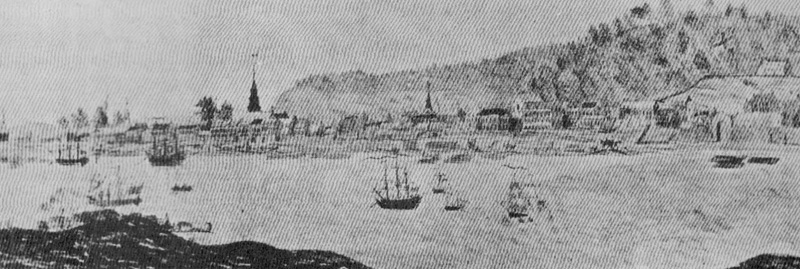
HISTORICAL EVENTS THAT TOOK PLACE ON THIS DAY IN CANADA
3 November

St. Helen's Island, Montreal
St. Helen's Island Granted to Charles Le Moyne
St. Helen's Island, Montreal, site of Expo '67, was given to a member of the Le Moyne family of fighting brothers on November 3, 1672. As Ste. Hélène was one of the most famous of the Le Moyne (see February 9), it might be thought that the island was called after him, but this was not the case. The island was named by Champlain in honour of his wife whom he married in Paris, in 1610, when she was only twelve years old! Champlain was forty-three.
Since Hélène was so young, the marriage contract stipulated that she must remain with her parents for two years before going to Canada. Instead she did not set out until 1620, when she was twenty-two years old. By this time she had become an attractive, mature woman accustomed to the gracious living of Paris. She arrived at Quebec with trunk loads of the latest Parish fashions. The style of the day was dainty dresses with rebato collars, wrist cuffs of pointed lace, graceful slashed sleeves, barred petticoats, and polonian shoes.
Champlain had neglected his home, L'Habitation, and it was listing like a ship in a heavy sea! It was draughty, cold, and the roof leaked. It did not take him long to realize that things had to be improved; so he took some of the men working for the Récollet fathers and made his home dry and warm.
Life in Quebec did not live up to Hélène's expectations. Champlain himself was now fifty-three, and no longer able to take the adventurous journeys into the wilderness that had made him such a hero in his wife's eyes. He had not attempted to revive the Order of the Good Time that had been so successful at Port Royal (see May 11), and on the long, winter nights, all Hélène could do was climb the trail to the summit and visit the friendly stone home of the Héberts.
The marriage was not successful. Champlain only mentioned it twice in his diary: the day his wife arrived, and the day she went back to France four years later. Hélène wanted to enter a convent, but Champlain would not agree. After he died she became a nun and founded a convent of her own.
OTHER NOTABLE EVENTS ON THIS DAY IN CANADIAN HISTORY
3 November
-1667 The Treaty of Westminster restored Acadia to France although the actual transfer did not take place until the Treaty of Breda in 1670.
-1894 The first issue of Le Temps, Ottawa, was published.
-1957 One of the most advanced atomic energy reactors in the world opened at Chalk River, Ontario.